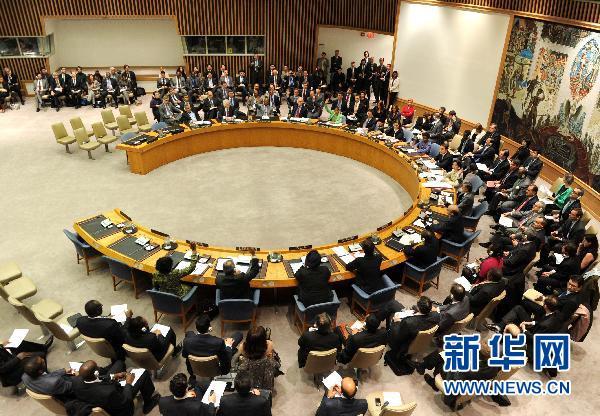UN Security Council okays no-fly zone over Libya
The UN Security Council on Thursday adopted a resolution to authorize a no-fly zone over Libya and called for "all necessary measures," excluding troops on the ground, to protect civilians under threat of attack in the North African country.
|
|
|
The UN Security Council on Thursday adopted a resolution to authorize a no-fly zone over Libya and called for "all necessary measures," excluding troops on the ground, to protect civilians under threat of attack in the North African country. |
The resolution was adopted with 10 voting in favor and five abstentions. Under the UN Charter, the adoption requires nine yes votes from the 15 Council members and the absence of a negative vote by any of the five permanent members -- Britain, China, France, Russia and the United States.
China and Russia, the two permanent members with veto power on the Council, and Brazil, Germany and India, the three non- permanent Council members, abstained from the voting on the draft resolution, which was presented by France, Lebanon, Britain and the United States. Lebanon is one of the 10 non-permanent members of the Security Council.
The Security Council "decides to establish a ban on all flights in the airspace of the Libyan Arab Jamahiriya in order to protect civilians," the resolution said.
However, the resolution excluded "an occupation force" in Libya.
The enforcement of the no-fly zone was endorsed by the Arab League in its decision at the end of the March 12 meeting on the situation of Libya.
The resolution "demands the immediate establishment of a ceasefire and a complete end to violence and all attacks against, and abuses of, civilians."
Also present at the Council meeting were UN Deputy Secretary-General Asha-Rose Migiro, representing UN Secretary- General Ban Ki-moon who is on his visit to Guatamala, and French Foreign Minister Alain Juppe, who just flew to New York on Thursday for the Council meeting.
The Security Council authorized the UN member states "to take all necessary measures" to "protect civilians and civilians populated areas under threat of attack" in Libya, "including Benghazi," a key eastern city currently held by the rebels, the resolution said.
The member states can act "nationally or through regional organizations or arrangements" in taking these measures, the resolution said.
The Security Council "requests the member states concerned to inform the (UN) secretary-general immediately of the measures they take" and this "shall be immediately reported to the Security Council," the resolution said.
The Security Council "recognizes the important role of the League of Arab States in matters relating to the maintenance of international peace and security in the region," the resolution said.
The Security Council "calls upon all member states, acting nationally or through regional authorizations or arrangements, to provide assistance, including any necessary overflight approvals, for the purposes of implementing" the new UN document, the resolution said.
The Security Council reiterated "the responsibility of the Libyan authorities to protect the Libyan population" and reaffirmed that "parties to armed conflicts bear the primary responsibility to take all feasible steps to ensure the protection of civilians," said the resolution.
The Security Council expressed "its determination to ensure the protection of civilians and civilian populated areas and the rapid and unimpeded passage of humanitarian assistance and the safety of humanitarian personnel," the resolution said.
The Security Council deplored "the continuing use of mercenaries by the Libyan authorities," the resolution said.
Meanwhile, the resolution also stepped up sanctions against Libya, including a strengthened arms embargo and assets freeze, imposed by Resolution 1970 which was unanimously adopted by the Security Council last month.
The Security Council decided that the asset freeze, imposed by Resolution 1970, "shall apply to all funds, other financial assets and economic resources which are on their territories, which are owned or controlled, directly or indirectly, by the Libyan authorities," the resolution said.
The assets of the Central Bank of Libya and the Libyan National Oil Company are to be frozen according to the resolution.
The Security Council affirmed that the assets frozen in accordance with relevant UN resolutions "shall be made available as soon as possible to and for the benefit of the Libyan people," the resolution said.
The resolution expressed "grave resolution at the deteriorating situation, the escalation of violence, and the heavy civilian casualties."
The Security Council condemned "the gross and systematic violation of human rights, including arbitrary detentions, enforced disappearances and summary executions," the resolution said.
The Security Council further condemned "acts of violence and intimidation committed by the Libyan authorities against journalists, media professionals and associated personnel" and urged the Libyan authorities "to comply with their obligations under international humanitarian law."
The resolution also requested the secretary-general "to create for an initial period of one year" a group of up to eight experts to assist the Security Council's Libya sanctions committee "in carrying out its mandate."
The proposed panel is also requested to "gather, examine and Analyze information from States, relevant United Nations bodies, regional organizations and other interested parties" regarding the implementations relevant UN resolutions, the resolution said.
 0
0 








Go to Forum >>0 Comments